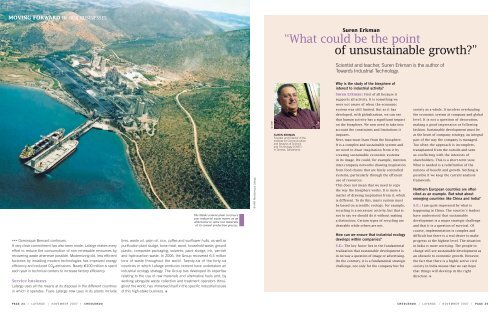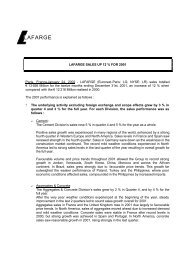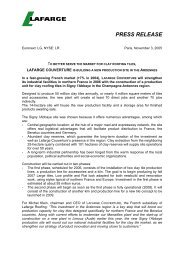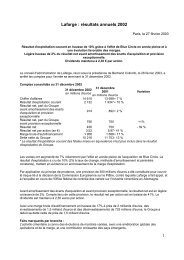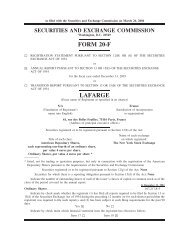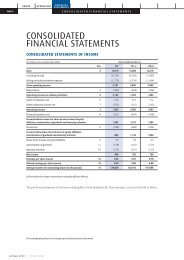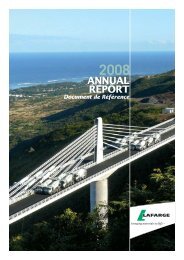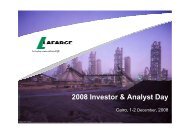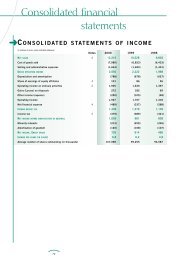The magazine - Lafarge
The magazine - Lafarge
The magazine - Lafarge
Create successful ePaper yourself
Turn your PDF publications into a flip-book with our unique Google optimized e-Paper software.
MOVING FORWARD IN OUR BUSINESSES<br />
••• Dominique Bernard continues.<br />
A very clear commitment has also been made: <strong>Lafarge</strong> makes every<br />
effort to reduce the consumption of non-renewable resources by<br />
recovering waste whenever possible. Modernizing old, less efficient<br />
factories by installing modern technologies has improved energy<br />
efficiency and reduced CO 2 emissions. Nearly €100 million is spent<br />
each year in technical centers to increase factory efficiency.<br />
Service business<br />
<strong>Lafarge</strong> uses all the means at its disposal in the different countries<br />
in which it operates. Fuels <strong>Lafarge</strong> now uses in its plants include<br />
<strong>The</strong> Milaki cement plant in Greece<br />
uses industrial waste waters as an<br />
alternative to some raw materials<br />
of its cement production process.<br />
tires, waste oil, palm oil, rice, coffee and sunflower hulls, as well as<br />
purification plant sludge, bone meal, wood, household waste, ground<br />
plastic, composite packaging, solvents, paint sludge, ink, varnish<br />
and hydrocarbon waste. In 2006, the Group recovered 6.5 million<br />
tons of waste throughout the world. Twenty-six of the forty-six<br />
countries in which <strong>Lafarge</strong> produces cement have undertaken an<br />
industrial ecology strategy. <strong>The</strong> Group has developed its expertise<br />
relating to the use of raw materials and alternative fuels and, by<br />
working alongside waste collection and treatment operators throughout<br />
the world, has immersed itself in the specific industrial issues<br />
of this high-stake business. ■<br />
Suren Erkman<br />
“What could be the point<br />
of unsustainable growth?”<br />
SUREN ERKMAN<br />
Founder and Director of the<br />
Institute for Communication<br />
and Analysis of Science<br />
and Technology (ICAST)<br />
in Geneva, Switzerland.<br />
Why is the study of the biosphere of<br />
interest to industrial activity?<br />
Suren Erkman : First of all because it<br />
supports all activity. It is something we<br />
were not aware of when the economic<br />
system was still limited. But as it has<br />
developed, with globalization, we can see<br />
that human activity has a significant impact<br />
on the biosphere. We now need to take into<br />
account the constraints and limitations it<br />
imposes.<br />
Next, man must learn from the biosphere.<br />
It is a complex and sustainable system and<br />
we need to draw inspiration from it by<br />
creating sustainable economic systems<br />
in its image. We could, for example, mention<br />
inter-company networks drawing inspiration<br />
from food chains that are finely controlled<br />
systems, particularly through the efficient<br />
use of resources.<br />
This does not mean that we need to copy<br />
the way the biosphere works. It is more a<br />
matter of drawing inspiration from it, which<br />
is different. To do this, man's system must<br />
be based on scientific ecology. For example,<br />
recycling is a necessary activity, but that is<br />
not to say we should do it without making<br />
a distinction. Certain types of recycling are<br />
desirable while others are not.<br />
How can we ensure that industrial ecology<br />
develops within companies?<br />
S.E.: <strong>The</strong> key factor lies in the fundamental<br />
realization that sustainable development is<br />
in no way a question of image or advertising.<br />
On the contrary, it is a fundamental strategic<br />
challenge, not only for the company but for<br />
society as a whole. It involves overhauling<br />
the economic system at company and global<br />
level. It is not a question of decoration,<br />
making a good impression or following<br />
fashion. Sustainable development must be<br />
at the heart of company strategy, an integral<br />
part of the way the company is managed.<br />
Too often the approach is incomplete,<br />
transplanted from the outside and seen<br />
as conflicting with the interests of<br />
shareholders. This is a short-term view.<br />
What is needed is a redefinition of the<br />
notions of benefit and growth. Nothing is<br />
possible if we keep the current analysis<br />
framework.<br />
Northern European countries are often<br />
cited as an example. But what about<br />
emerging countries like China and India?<br />
S.E.: I am quite impressed by what is<br />
happening in China. <strong>The</strong> country’s leaders<br />
have understood that sustainable<br />
development is a major strategic challenge<br />
and that it is a question of survival. Of<br />
course, implementation is complex and<br />
difficult but there is a real desire to make<br />
progress at the highest level. <strong>The</strong> situation<br />
in India is more worrying. <strong>The</strong> people in<br />
charge still see sustainable development as<br />
an obstacle to economic growth. However,<br />
the fact that there is a highly active civil<br />
society in India means that we can hope<br />
that things will develop in the right<br />
direction. ■<br />
P A G E 2 4 | L A FA R G E | N O V E M B E R 2 0 0 7 | C R E S C E N D O C R E S C E N D O | L A FA R G E | N O V E M B E R 2 0 0 7 | P A G E 2 5<br />
© ARR Mediatheque <strong>Lafarge</strong><br />
© ARR<br />
Scientist and teacher, Suren Erkman is the author of<br />
Towards Industrial Technology.


